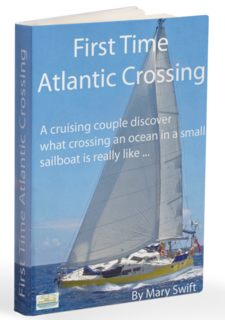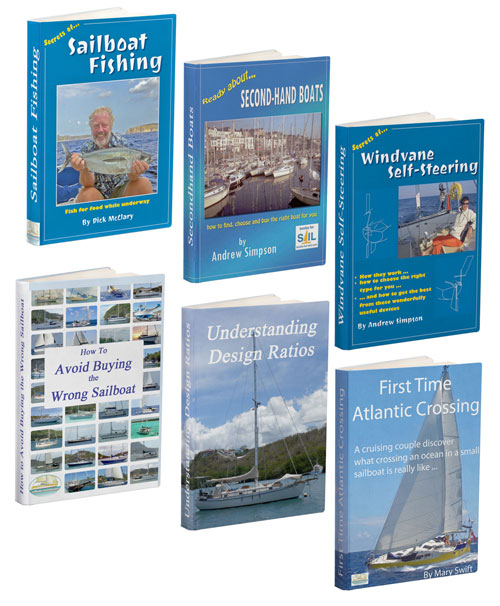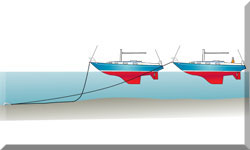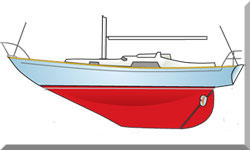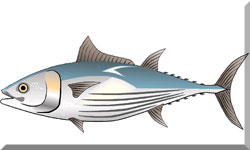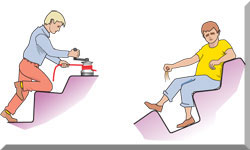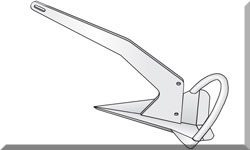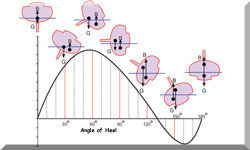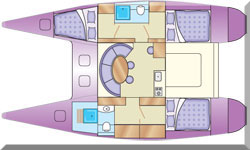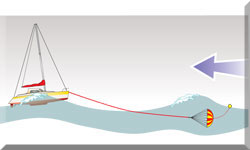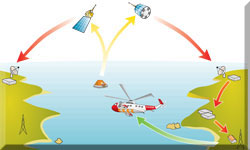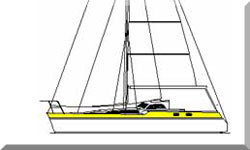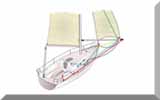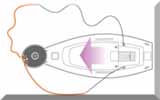- Home
- Mary's Journal
- At Anchor
- At anchor, Muros (2)
At Anchor and Ashore in the
Ria de Muros - part 2
It's Saturday 11th August 2001 and surprisingly, after the fiesta in Portosin yesterday, we're up bright and early (well 0800 hours, early for us) and ready to walk into town in time to catch the 0930 bus to Noya.
We have arranged to visit Santiago with Paul, Roz and Jenny. soon we're joined by the others and eventually manage, with help, to find the bus stop in Portosin.
The reason it was so difficult to find, is because it is actually a telephone box, which has nothing at all on it to indicate that it could in any way be a bus stop.
The bus seems to be late so Dick asks in a nearby shop when the bus is due. It seems that Paul and Dick had not read the timetable correctly last night (too much wine perhaps?); the bus leaves Noya at 0930 hours and is due at this bus-stop at 1010 hours.
We walk back to a café for a coffee while we are waiting. We hear the gunshots again and ask a local man what they are. They are extremely loud fireworks, thunder flashes really and will be let off intermittently throughout the fiesta, which will last for two more days.
On Sunday at midnight there will be a big firework display and people from all around the Ria will attend. It is always fiesta time in Galicia and the Galicians love these loud bangs. So this is what we have been hearing, not gunshots.
The bus is on time. It is actually an air-conditioned coach and we are off, travelling at a rate of knots for the eight kilometres to Noya, stopping at various pick up points en route. The countryside is lovely and some of the properties we pass on the outskirts of the villages are very attractive and grand.
Noya is a large town situated at the head of the Ria and we are glad to be seeing it from the coach and not on foot. At 1030 we are ensconced on an even bigger, classier coach for the hour-long ride to Santiago. We are now travelling through the mountains, but it does not seem mountainous, more hilly.
The area is lush and very green with many wooded areas covered at ground level by large ferns. The views are stunning; looking down through large pastured valleys. There are not many animals, just a few cows and sheep (we have seen very few animals in Galicia) but maize is grown in abundance. We think it is probably grown for animal fodder as the only corn on the cob we have seen in the vegetable shops has been imported pre-packed corn.
The craggy bits of the mountains are more like the Tors on Dartmoor back home in Devon, but we are cutting through the mountains not going over the top of them, so we are mainly seeing the green areas and the many villages.
Santiago is a major city and we are unimpressed by the many high-rise buildings that we see on the outskirts, although the University and its campus area are quite impressive. We have come to Santiago to visit Santiago de Compostela, the old city in the heart of Santiago, famous for its magnificent cathedral, churches and buildings, small and twisting paved roads and fountains.
We arrive at the bus station and have no idea as to where we are although we had glimpsed the towers of the cathedral earlier. We ask directions and the man we ask walks with us for quite a way, talking nineteen to the dozen, in Spanish, and even Dick has a problem understanding him. A few 'Si Señor's' now and then and he appears happy enough. His directions though are sound and thirty minutes later we reach Santiago de Compostela.
As we pass a church, we hear music playing and go inside. It is quite beautiful, decorated with painted ceilings and there are large statues of cherubs as well as the statues of Christ and the Madonna. Just as we think the music must be piped, we move forward and looking back we see a balcony where a little old lady is playing an imposing organ and three other ladies are playing various harpsichord type instruments. The music is delightful.
We leave the church and walking through the twisting narrow streets, passing numerous cafes and bars, we find ourselves at the back of another church. We have still not found the cathedral. The town is bigger than we had first thought so we keep moving around these wonderful old buildings looking for the twin towers that depict the cathedral.
We walk down some steps to a beautiful fountain, turn a corner and enter a huge plaza surrounded by buildings. To our right we see the twin towers and the very impressive entrance to the cathedral. Thousands of people from medieval pilgrims to modern day tourists have made pilgrimages to this cathedral from many starting points in Europe, one of which is in Cornwall.
The pilgrims make the journey carrying a shell, a gourd (for water) and a walking stick. Originally, if pilgrims showed the shell, they were offered food, drink and shelter during their pilgrimage. Nowadays, this is just a tradition although many modern day pilgrims still make the pilgrimage carrying the shell, gourd and stick.
The town is quite stunning; the buildings being of medieval and baroque design, but there is a disappointing tackiness here. It is naturally full of tourists, you would expect that, but the souvenir stalls are everywhere, selling cheap and tacky souvenirs. The icons and other knick-knacks, to me, appear to be garish and I see nothing at all that I would want to buy (or would want anyone to buy for me). Just as we find the main entrance, the cathedral closes for an hour for the blessing of the pilgrims who have arrived today.
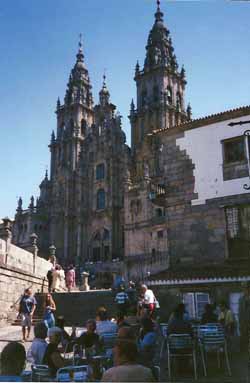
We sit at one of the cafes, in the shade, which offers a magnificent view of the cathedral, and order beers all round. When the cathedral opens we women leave the men at the café and go inside. People are queuing to kiss the famous kissing stone and also to walk behind the huge altar where there are big statues of cherubs and angels all in gold.
There are two enormous organs fanning out overhead. It's a magnificent building but the inside is not nearly as impressive as the first church we had visited.
It's jam-packed with tourists and we have seen enough and quickly leave by a side door and walk through the impressive cloisters back to Dick and Paul.
We are joined by Dave and Nick, the Irishmen, visiting Santiago before flying back to Dublin (leaving their boat in Portosin). They are staying in the square, in one of these magnificent buildings, originally a hospital, which has been converted into a hotel. The hotel has four quadrangles with all the rooms and restaurants opening onto them.
This is a very expensive hotel. Dave is quite a character and Nick is the quiet historian. They have been friends for years and say that they are retired fishermen. The more we see of them we realise there is more to them than meets the eye. These are two wealthy gentlemen; not the least bit like retired fishermen somehow. Such good fun though!
The weather today is perfect; blue sky, sun and very clear visibility (and also extremely hot). Dave remarks on how lucky we are to be seeing the cathedral in the sun. We are high up in the mountains and the weather is usually wet and the cathedral is almost always shrouded in mist. We leave them enjoying an expensive meal and find a smaller restaurant, away from the square, and share a plate of mussels in an onion, tomato and pimiento sauce. This is really delicious; we have chosen well.
It is nearly 1600 hours so we make our way back to the bus station, keeping to the shady areas wherever we can, because it is really hot now. We had been told that the bus ran on the hour, every hour, but not today, we have to wait until 0600 hours. Luckily the bus station is air-conditioned; we are all tired and snooze for an hour on the many bench seats. This of course is one of the problems with public transport, which no doubt could have been allayed if we had checked on the times first (we could have stayed longer in the restaurant). But the bus was on time and the connection at Noya also timely and we set down at Portosin at 1930 hours. It has been a good trip and Paul, Roz and Jenny have been good company.
Portosin is quite a small village and has only one main shopping street. We buy some provisions at a small supermarket and Dick buys some fresh squid (£1 for a kilo), but what do I do with squid? Time, and hopefully one of my cookery books, will tell.
It has been very hot today, the wind has dropped (we are told later that it has been the hottest day of the year). Leaving the others, we store our provisions on board Alacazam and then take a much needed shower at the Yacht Club. I wear my new orange dress for the first time and after watching the sunset from the balcony we stay at the Yacht Club for dinner. John, the single-handed sailor on the 50ft yacht with the cats as companions, joins us for dinner. He is travelling on his way back from the Caribbean to Holyhead in Anglesey. He and his third wife, Sue, run an embroidery business (logos on polo shirts mainly) and they have won a substantial order from Marks and Spencer. She has already flown home to handle the order and he is sailing the yacht back on his own.
We are saddened by some of the horror stories he relates about Venezuela. Since the flood, the people have found it difficult to find work and have reverted to crime as a way of making a living. A fast power-boat; the crew demanding cigarettes and money had approached one Dutch couple, 100 miles off land. When none was given they shot the skipper and ransacked the yacht while his wife was attending to him.
John said he would also not sail north of the Grenadines again because, in his opinion, prices were getting extortionate on the other islands, as the islanders have learnt to exploit tourists. He loved Trinidad and Tobago and the Tobago Keys. He said he really did not want to put us off going, that we must go and see it once, but he now much prefers Portugal and Spain.
Paul has come to tell us that he has just received a phone call from his daughter in England and she will be flying out to Vigo the day after tomorrow, so he, Roz and Jenny will be leaving early in the morning to sail to Bayona to meet her. We may possibly catch up with them again there. John too, is leaving tomorrow to sail non-stop to Penzance. We all bid our goodnights and fair winds. We are too tired to hit the town and although we can hear the music, it doesn't keep us awake and we have a good night's sleep.
Sunday 12 August 2001
The two yachts have already left by the time we wake up. The sun is still warm and we have a lazy morning. Dick is preparing the squid that he bought yesterday. He's following the instructions from a super book that he bought in Sainsbury's called 'Fish' written by Sophie Grigson and her husband William Black. It describes different fish from all over the world, how to prepare them and also provides various recipes on how to cook them. The recipe we have chosen is to marinate the squid in kiwi fruit (to tenderise the squid), chillies, coriander, olive oil, lemon juice and cider vinegar; to be left in the fridge until dinner tonight.
We decide to take advantage of the marina facilities and wash Alacazam's decks and ropes. I wash down the surfaces inside thoroughly with disinfectant because I am getting fed up with the flies, but it appears that flies are not put off by disinfectant.
I take a pile of laundry to the launderette; these are the best washing machines yet. They are worked by token and for some reason the second machine keeps working without me having to put the token in, so I get a free wash.
While I am doing this Dick buys more fuel and goes into town to withdraw money from the bank. I am so industrious I even hang up the sheets that I have taken from the drier (someone else's and not totally dry) in order to use it to dry mine. When I remake the bed later I am going to change to the thinner duvet as the nights are so much warmer now.
Dick loves to talk to people and chats to two Spaniards whose boats are near to Alacazam. One (Manuel) has studied at Oxford and speaks perfect English. The Spaniard on the next yacht is a committee member and tells Dick that the club is actively encouraging visiting yachtsmen.
He explains that there are always fiestas in Galicia and this weekend's fiesta is for the Virgin Carmen who is the patron saint of fishermen. At 1800 hours there will be a procession of boats, any kind, with as many people on them as they can hold, and they will all parade in the Ria. His wife tells us that this will be her first time in the procession and that it is a very emotional moment for her. She has tears in her eyes; such a passionate people.
We watch the procession from the Yacht Club balcony where we meet Norman and Bella. They have been wintering in Lisbon in Portugal and are spending the summer cruising Galicia. They have some novels they would like to swap and meet us later on board Alacazam. I have only read one book but Dick has read four so at least we have five to swap. One of the books Norman has given us is 'The Green Mile'. We have the DVD on board and both want to read the book before we see the film.
Bella is Brazilian and can speak English, Portuguese, Spanish and French fluently. Norman is from Kent. He is going to Santiago tomorrow for a hernia operation and we can see that he is in quite a bit of pain. He is a carpenter by trade and they have taken five years to build their 34ft yacht constructed from plywood and epoxy. They have no plans to travel further afield as they love Spain and Portugal.
Before they had arrived, I had already prepared the second stage of the squid and also the salad accompaniment so I only had to griddle the squid for literally 30 seconds on each side, having to quickly turn them in case they over cooked. They were so tender; they just melted in the mouth like silk and tasted just wonderful.
At 2300 hours we were ready to hit the town. The Spanish just love to fiesta and there are so many people the town is packed. The band tonight is fronted by two gorgeous Spanish girls and a young man, who in looks and mannerisms is a dead ringer for Julian Clary. He is a very sensual and clever dancer.
At midnight we are treated to the best firework display we have ever seen. Plymouth Hoe has hosted some dazzling displays in its time but this display still had a few surprises we had not seen before. We were agog. All day the 'gunshot' fireworks were being let off; just a loud bang and then a puff of smoke. Seeing these, we could have no idea that this small fishing village would put on such a display tonight.
On the way back to Alacazam we buy sweet almonds and another delicacy that Dick thinks is piped potato fried. I eat one and Dick eats too many (or so his stomach tells him later); I am not sure what we are eating, but I do not think we will bother again. The town is packed and the atmosphere is electric; the Spaniards will party through the night, but we slowly wind our way back to Alacazam and another good night's sleep.
Next: At Anchor and Ashore in Ria de Muros- Part 3
Recent Articles
-
Wauquiez Gladiateur 33 for Sale
Apr 10, 24 05:40 AM
'Kesh', my Wauquiez Gladiateur 33 is only for sale because we've decided to go for a larger sailboat. She currently berthed in Florida, USA. -
'Cabo Frio', a Catalina Morgan 43 for sale
Apr 01, 24 08:35 AM
This Catalina Morgan 43 is for sale at a very reasonable price. She offers up to 7 berths in 2 cabins + saloon. There is full 6'5" standing headroom and good ventilation throughout. -
Live Aboard Boats For Sale
Mar 30, 24 07:02 PM
Ready to live the dream? Then browsing through this listing of live aboard boats for sale might just get you on your way...
